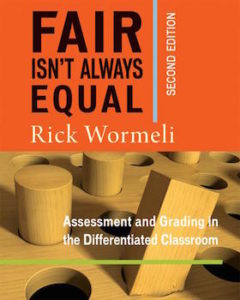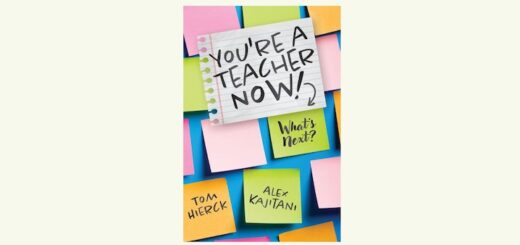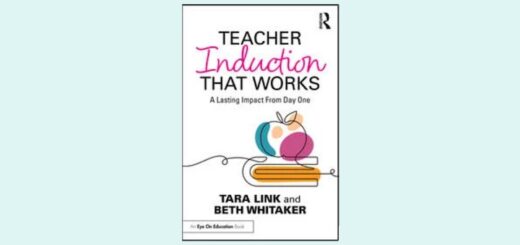Fair Isn’t Always Equal: A Must-Read 2nd Edition
Fair Isn’t Always Equal: Assessment and Grading in the Differentiated Classroom (2nd Edition)
By Rick Wormeli
(Stenhouse Publishers, 2018 – Learn more)
 Reviewed by Jennifer Randall
Reviewed by Jennifer Randall
Reading Rick Wormeli’s Fair Isn’t Always Equal inspires me to be a better teacher. Wormeli sets the bar high for his readers, as he clearly did for his students. And by doing so, he shows the power of differentiation in education. As one of his students put it, “’Man, Mr. Wormeli makes you do it over and over again until you learn it. It sucks!’” (p. 215.)
 This is not a book to browse through over summer vacation. This is a book to work with, to take chapter by chapter and use to assess your own assessment and grading practices. This is a book to commit to, with a community of colleagues, to discuss, to debate, to share. It is a book for teachers and administrators.
This is not a book to browse through over summer vacation. This is a book to work with, to take chapter by chapter and use to assess your own assessment and grading practices. This is a book to commit to, with a community of colleagues, to discuss, to debate, to share. It is a book for teachers and administrators.
But it is also an important book, so if the summer is what you have, then by all means, bring the book to the beach.
Differentiating for readers
Wormeli doesn’t just offer good information; he writes well, and he teaches well. With patience and innovation, Wormeli differentiates for the reader. Through vignettes, anecdotes, definitions, tips, and multiple examples across disciplines and grade levels, we gain a deeper understanding of the ideas and strategies he puts forth.
For example, in the chapter “Tiering Assessments,” Wormeli begins by exploring multiple definitions of the practice, provides in-depth examples of graphing algebraic equations, and training young children’s eyes to track left to right. He offers insights for those new to the practice and gives a comprehensive list of strategies for tiering. He includes a survey of research-based methods including Tomlinson’s Equalizer, Bloom’s Revised Taxonomy and Webb’s Depth of Knowledge. Templates, samples and questions for discussion round out the chapter.
Wormeli is well-read, and broadly so. He references studies to support his case and includes resources for further study on many specific points within the book, from understanding standards to designing rubrics. When a researcher offers a conflicting opinion, Wormeli doesn’t shy away – he offers both his experience and the differing point of view with an implicit invitation to readers to dig in and arrive at our own conclusions.
In addition to being well-written and inviting further study, Fair Isn’t Always Equal lays the groundwork for group study by inviting participation. Wormeli writes: “Take a moment to brainstorm a list of ways that teachers can help students demonstrate what they know and are able to do,” (p. 25) and “feel free to use these principles as one set of criteria with which to examine your own assessments and their use in your classroom” (p. 63). In addition, the publisher’s website provides supplementary materials for further study.
Many chapters, including “Descriptive Feedback and Student Self-Assessment,” “Tiering Assessments,” and “Creating Good Test Questions,” offer immediately implementable strategies. And while we may not be able to adopt as many ideas from the grading section until the coming year, Wormeli’s reasoning, examples, and logistical details in chapters such as “Redos and Retakes,” “Grading Scales,” and “Gradebooks and Report Cards” both make embracing new policies more feasible and show how crucial it is that we do so.
Understanding teachers’ reality
After nearly 40 years as an educator, Wormeli is compassionate towards teachers. He understands time required to grade a set of papers (“twenty-two hours to mark one set of three- to four-page writings from 185 students,” p. 135), and discusses ways to assess efficiently. In the chapter “Redos and Retakes” Wormeli makes a strong case using real-world examples (if we fail our drivers test, we retake it as many times as we need to and then receive full credit – a license). But he also offers a realistic look at how to manage the process in a way that both supports student learning and mitigates the extra workload placed on teachers.
While he is compassionate, he is also exacting. Fair Isn’t Always Equal is a rallying cry for teachers to hold to our principles and do “whatever it takes to maximize a student’s learning at every turn” (p. 277). He urges us to “do our jobs” by really getting to know our students, providing developmentally appropriate and substantive content, by differentiating instruction and assessment, and by grading in a way that reflects “the student’s performance against a standard, nothing else” (p. 148).
When school policies conflict with our principles, he suggests we “do the ethical thing in our own classrooms, but then translate our response into the language of the school or district so we can keep our jobs” (p. 189). And then he presses us to join the committee responsible for reviewing the policy.
Essential reading for administrators
There are several facets of the book administrators will find helpful as well. First, this book provides an excellent resource for those forming assessment or grading policies as Wormeli provides the philosophy and research behind each of the practices explored.
Second, he urges administrators to put these assessment practices in place with the teachers in their districts. For example, in the chapter on “Descriptive Feedback and Student Self-Assessment,” Wormeli not only addresses how teachers can provide descriptive feedback to students, but also shows the importance of administrators and school leaders providing descriptive feedback to teachers.
Wormeli is bold. He is passionate, articulate, and relentless in his quest to make a case for differentiated education. In the second chapter he puts forth 15 tenets with responses that show each tenet in action. On first read, I met some of the responses with a resounding “yes!” while others seemed improbable or even outlandish. However, in revisiting the tenets after reading the book, I found my stance had shifted. I’m in. I’m ready to post those tenets on my gradebook, above my desk, and on my classroom door.
And when I misstep, I’ll go do something about it. Because too much is at stake not to.
Read an excerpt from Fair Isn’t Always Equal here at MiddleWeb
Jeny Randall teaches 4th and 5th grade language arts and science at Saratoga Independent School in New York State. As Middle School Coordinator, she is overseeing the curriculum and program development for the new middle school. Outside of school Jeny teaches yoga, reads whatever students send her way, and spends time with her family, outside if possible.


































Thank you, Jeny. Your commentary here about how the book’s content helps educators shift thinking, is practical, and is a good investment of such a scarce resource as time means the world. I sure hope it helps teachers and administrators converse from an informed thoughtfulness, not an uninformed myth. I really appreciate the time you took to read the book and look at its content critically. Thank you.